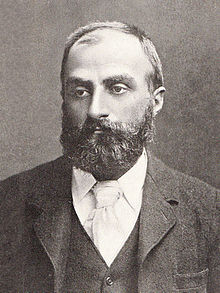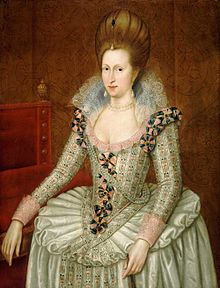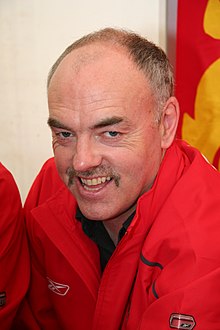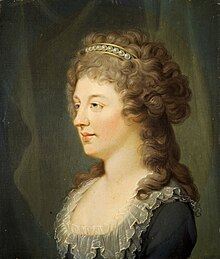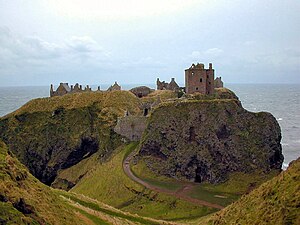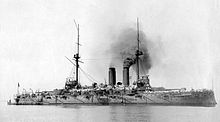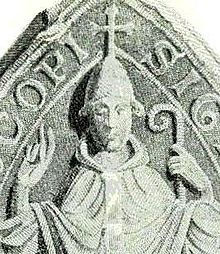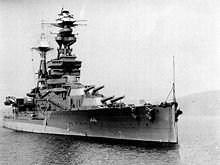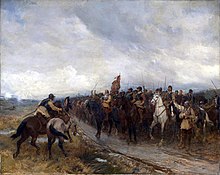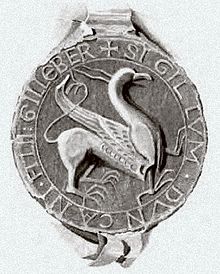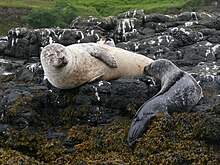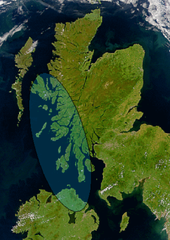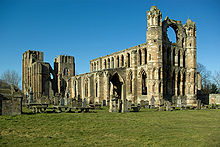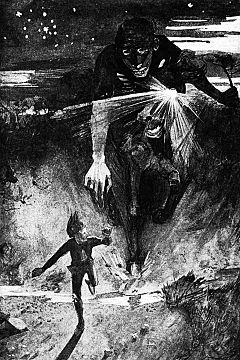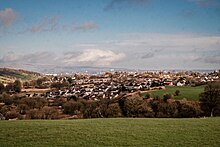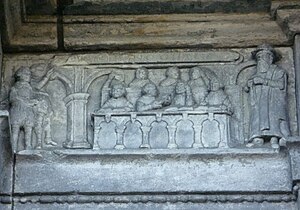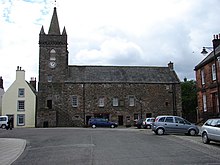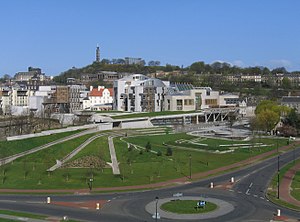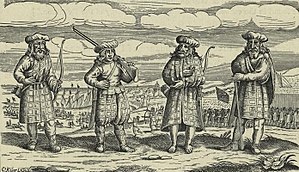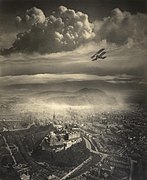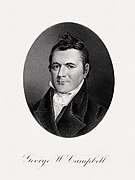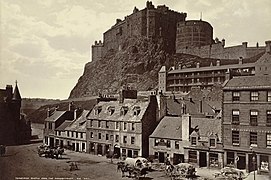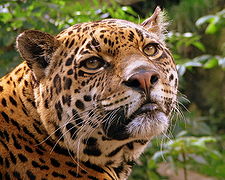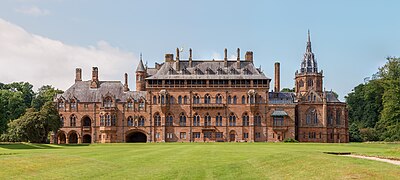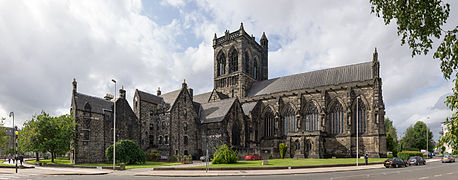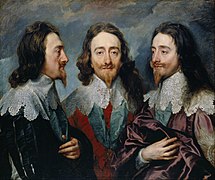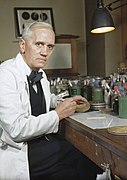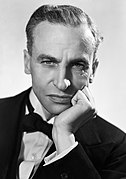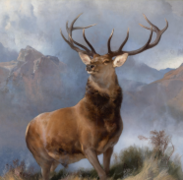Portal:Scotland/Featured
Appearance
The Scotland Portal
View from An Teallach
| Main Page | Selected articles 1 | Selected articles 2 | Selected biographies | Selected quotes | Selected pictures | Featured Content | Categories & Topics |
Selection of featured articles
Selection of good articles
Dunnottar Castle (Scottish Gaelic: Dùn Fhoithear, "fort on the shelving slope") is a ruined medieval fortress located upon a rocky headland on the north-eastern coast of Scotland, about 2 miles (3 kilometres) south of Stonehaven. The surviving buildings are largely of the 15th and 16th centuries, but the site is believed to have been fortified in the Early Middle Ages. Dunnottar has played a prominent role in the history of Scotland through to the 18th-century Jacobite risings because of its strategic location and defensive strength.
Dunnottar is best known as the place where the Honours of Scotland, the Scottish crown jewels, were hidden from Oliver Cromwell's invading army in the 17th century. The property of the Keiths from the 14th century, and the seat of the Earl Marischal, Dunnottar declined after the last Earl forfeited his titles by taking part in the Jacobite rebellion of 1715. The castle was restored in the 20th century and is now open to the public. (Full article...)
The 2001 Scottish Masters (known as the 2001 Regal Scottish Masters for sponsorship reasons) was a professional non-ranking snooker tournament which took place at the Thistle Hotel in Glasgow, Scotland, from 18 to 23 September 2001. It was the first time the tournament was played in Glasgow since the 1989 edition. The competition was the second of four invitational World Professional Billiards and Snooker Association (WPBSA) events of the 2001–02 season. It was broadcast on BBC Scotland and Eurosport and was sponsored by the cigarette brand Regal.
John Higgins, the top-ranked Scottish player, won the tournament, defeating the defending champion and world title holder Ronnie O'Sullivan 9–6 in the final. It was the first time that Higgins had won the competition it was the 22nd ranking tournament victory of his career. He earned £63,000 from a prize fund pool of £200,000. O'Sullivan made the highest break of the competition of 134 in his semi-final victory over Marco Fu. (Full article...)
John Higgins, the top-ranked Scottish player, won the tournament, defeating the defending champion and world title holder Ronnie O'Sullivan 9–6 in the final. It was the first time that Higgins had won the competition it was the 22nd ranking tournament victory of his career. He earned £63,000 from a prize fund pool of £200,000. O'Sullivan made the highest break of the competition of 134 in his semi-final victory over Marco Fu. (Full article...)
Lists of featured content
| This is a list of recognized content, updated weekly by JL-Bot (talk · contribs) (typically on Saturdays). There is no need to edit the list yourself. If an article is missing from the list, make sure it is tagged (e.g. {{WikiProject Scotland}}) or categorized correctly and wait for the next update. See WP:RECOG for configuration options. |
Featured articles
- Áedán mac Gabráin
- Anglo-Scottish war (1650–1652)
- Anne, Queen of Great Britain
- Anne of Denmark
- HMS Argus (I49)
- Japanese battleship Asahi
- Battle of Blenheim
- Blue men of the Minch
- William Bruce (architect)
- William Speirs Bruce
- Burke and Hare murders
- Burnt Candlemas
- Constantine II of Scotland
- Cullen House
- David I of Scotland
- Walter Donaldson (snooker player)
- Donnchadh, Earl of Carrick
- Alec Douglas-Home
- Battle of Dunbar (1650)
- Edward I of England
- Elgin Cathedral
- Queen Elizabeth The Queen Mother
- Fauna of Scotland
- From the Doctor to My Son Thomas
- Rachel Chiesley, Lady Grange
- Margaret Macpherson Grant
- Great North of Scotland Railway
- Bryan Gunn
- Battle of Halidon Hill
- HMS Hood
- Battle of Inverkeithing
- James II of England
- James VI and I
- Jocelin of Glasgow
- Kelpie
- John Knox
- Elizabeth Maitland, Duchess of Lauderdale
- Gregor MacGregor
- Mary, Queen of Scots
- Murray Maxwell
- William McGregor (football)
- Nebula Science Fiction
- Neilston
- Nuckelavee
- Order of the Thistle
- Pitfour estate
- HMS Ramillies (07)
- Renewable energy in Scotland
- Representative peer
- HMS Royal Oak (08)
- Scotland in the High Middle Ages
- Scotland national football team
- Scottish National Antarctic Expedition
- Shapinsay
- Isle of Skye
- Charlotte Stuart, Duchess of Albany
- HMS Vanguard (23)
- Second War of Scottish Independence
- John Wark
- Westminster Assembly
- John Michael Wright
Former featured articles
Good articles
- A82 road
- 2001 Scottish Masters
- 2002 Scottish Masters
- 2014 Scottish Labour leadership election
- 2022 Aberdeen City Council election
- 2022 Aberdeenshire Council election
- 2022 Angus Council election
- 2022 Argyll and Bute Council election
- 2022 Clackmannanshire Council election
- 2022 East Ayrshire Council election
- 2022 Glasgow City Council election
- 2022 North Ayrshire Council election
- 2022 South Ayrshire Council election
- 2022 South Lanarkshire Council election
- Aberdeen F.C.
- Aberdeen F.C.–Rangers F.C. rivalry
- Aberdour Castle
- William Adam (architect)
- Arbroath
- Architecture of Scotland
- Architecture in early modern Scotland
- Architecture in modern Scotland
- Architecture of Scotland in the Industrial Revolution
- Architecture of Scotland in the Middle Ages
- Architecture of Scotland in the Roman era
- Architecture of Scotland in the prehistoric era
- Isle of Arran
- Art in Medieval Scotland
- Art in early modern Scotland
- Art in modern Scotland
- James Balfour (died 1845)
- John Barrowman
- Battle of Barry
- Jim Baxter
- Ian Begg (architect)
- Ben Nevis
- Lewis Benson (boxer)
- Guy Berryman
- The Bhoys from Seville
- Billy Boys
- The Black Island
- HMS Bonaventure (31)
- Boobrie
- Eilley Bowers
- Bill Bowman (Scottish politician)
- British people
- Gordon Brown
- Brownie (folklore)
- Alexander Buchan (artist)
- Calendar (New Style) Act 1750
- James Campbell (British Army officer, died 1745)
- Camus Cross
- Thomas Carlyle
- Castles in Scotland
- Celtic F.C. in European football
- Celtic Park
- Erik Chisholm
- Church architecture in Scotland
- Winston Churchill
- Clan Maclachlan
- Clydesdale horse
- HMS Conqueror (1911)
- The Cookery Book of Lady Clark of Tillypronie
- Coxton Tower
- Craigiehall
- Lord Ninian Crichton-Stuart
- Cruachan Power Station
- Cullen Old Church
- 1966 European Cup Winners' Cup final
- The Daily Mash
- Dandie Dinmont Terrier
- Ruth Davidson
- Demographic history of Scotland
- Paul Dickov
- Mary Docherty
- Donkey Punch (novel)
- Doune Castle
- Dowhill Castle
- Dubh Artach
- Andrew Dudley
- Duncraig Castle
- Dunnottar Castle
- Dunrobin Castle
- Dunstaffnage Castle
- East Kirkton Quarry
- East Stirlingshire F.C.
- Easter Road
- Economy of Scotland in the Middle Ages
- Economy of Scotland in the early modern period
- Edinburgh Castle
- University of Edinburgh
- Edinburgh Zoo
- Education in Medieval Scotland
- Education in early modern Scotland
- Edzell Castle
- Eenoolooapik
- Eidyn
- Elcho Castle
- English invasion of Scotland (1400)
- Eriskay Pony
- Estate houses in Scotland
- 1884 FA Cup final
- Edward G. Faile
- Fairy Flag
- Falkirk Wheel
- Family in early modern Scotland
- James Ferguson, Lord Pitfour
- James Ferguson (Scottish politician)
- Finnieston Crane
- Flag of Scotland
- Flora of Scotland
- Sir Ewan Forbes, 11th Baronet
- Forglen House
- Forth Bridge
- Forth Valley Royal Hospital
- Dario Franchitti
- Château Gaillard
- Ryan Gauld
- Geography of Scotland in the Middle Ages
- Geography of Scotland in the early modern era
- Geology of Scotland
- Giffnock
- Gilli (Hebridean earl)
- Glass Swords
- The Glenlivet distillery
- Glenrothes
- Glorious Revolution in Scotland
- Government in early modern Scotland
- Government in medieval Scotland
- Isobel Gowdie
- Grey Gowrie
- John Gregorson Campbell
- Hampden Park
- Hibernian F.C.
- Highland cattle
- Highlands and Islands Alliance
- Lists of mountains and hills in the British Isles
- Hillforts in Scotland
- History of Scotland
- History of agriculture in Scotland
- Mary Hogarth
- Housing in Scotland
- How the Scots Invented the Modern World
- Leslie Hunter
- HMS Hurst Castle
- Ibrox Stadium
- 1902 Ibrox disaster
- Illieston House
- Inchdrewer Castle
- Inner Hebrides
- James Innes (British Army officer, died 1759)
- Charles Irving (surgeon)
- Islands of the Clyde
- Islay
- James I of Scotland
- Bert Jansch
- Jarlshof
- Jocky Wilson Cup
- Kelvin Scottish
- Battle of Kinghorn
- Kirkandrews, Dumfries and Galloway
- Kirkcaldy
- Kirkcudbright Tolbooth
- Labour Party of Scotland
- Johann Lamont
- Landscape painting in Scotland
- Billy Liddell
- Literature in early modern Scotland
- Kim Little
- Loch Arkaig treasure
- Loch Henry
- Lochleven Castle
- RAF Lossiemouth
- Murder of Alesha MacPhail
- Clan MacAulay
- Doris Mackinnon
- Sorley MacLean
- Richard Madden
- SS Manasoo
- James Clerk Maxwell
- Maybole Castle
- James McAvoy
- Stuart McCall
- Angus McDonald (Virginia militiaman)
- McEwan's
- Ewan McGregor
- John George McTavish
- Johnny McNichol
- Meantime (book)
- Mingulay
- Colin Mitchell
- Michelle Mone, Baroness Mone
- Monifieth
- William Montgomerie
- James Murray, Lord Philiphaugh
- Music in early modern Scotland
- John Mylne (died 1667)
- The National (Scotland)
- John Ogilby
- One Kiss
- Orkney
- Outer Hebrides
- Paisley witches
- Papa Stour
- Partick Thistle F.C.
- Portrait painting in Scotland
- Potion (song)
- Prehistoric art in Scotland
- Raasay
- RAF Machrihanish
- Ragnall ua Ímair
- Alex Raisbeck
- Rangers F.C. signing policy
- Renaissance in Scotland
- Richard Rennison
- Rhapsody (climb)
- Rockstar Dundee
- Romanticism in Scotland
- Andrew Ross (rugby union, born 1879)
- Royal Banner of Scotland
- Rusco Tower
- St Margaret's Church, Aberlour
- St Peter's Roman Catholic Church, Buckie
- St Rufus Church
- Scandinavian Scotland
- Schiehallion experiment
- Scotland during the Roman Empire
- Scotland in the Middle Ages
- Scotland in the early modern period
- Scotland in the late Middle Ages
- Scotland in the modern era
- Scotland national football team manager
- Scotland under the Commonwealth
- Scottish art
- 1999 Scottish Challenge Cup final
- 2002 Scottish Challenge Cup final
- 2007 Scottish Challenge Cup final
- Scottish Challenge Cup
- 1873–74 Scottish Cup
- 2012 Scottish Cup final
- 2019 Scottish Open (snooker)
- 1971 Scottish soldiers' killings
- Scottish Terrier
- Scottish art in the eighteenth century
- Scottish art in the nineteenth century
- Scottish religion in the eighteenth century
- Scottish religion in the seventeenth century
- Scottish society in the Middle Ages
- Scottish society in the early modern era
- Scuttling of the German fleet at Scapa Flow
- Sea Mither
- Bill Shankly
- Shetland
- Shieling
- Sieges of Berwick (1355 and 1356)
- Ian Smith (rugby union, born 1903)
- Jimmy Speirs
- Staffa
- Jessie Stephen
- Alexander Stoddart
- Stoor worm
- John Struthers (anatomist)
- Charles Edward Stuart
- Sundrum Castle
- Philipp Tanzer
- Tay Whale
- D'Arcy Wentworth Thompson
- Thurso
- Tibbers Castle
- Titan Clydebank
- Torf-Einarr
- Tradeston Flour Mills explosion
- Trident (UK nuclear programme)
- USS Tucker (DD-374)
- German submarine U-27 (1936)
- Urquhart Castle
- James Walker (Australian politician)
- James Walker (Royal Navy officer)
- William Middleton Wallace
- Warfare in Medieval Scotland
- Warfare in early modern Scotland
- Water bull
- West Highland White Terrier
- Robert White (Virginia physician)
- Krysty Wilson-Cairns
- Witch trials in early modern Scotland
- Andrew Wodrow
- Women in early modern Scotland
Former good articles
- Alexander Bain (inventor)
- Billy Bremner
- William Buchanan (locomotive designer)
- Canadian Gaelic
- Andrew Carnegie
- Carnoustie
- Coatbridge
- Catherine Cranston
- Arthur Conan Doyle
- Dundee United F.C.
- Steve Evans (footballer, born 1962)
- Evanton
- Forth Road Bridge
- Glasgow
- Glasgow, Paisley, Kilmarnock and Ayr Railway
- University of Glasgow
- Frank Hadden
- Halloween
- David Hume
- Jordanhill railway station
- Deborah Kerr
- Lothian Buses
- Gillian McKeith
- Andy Murray
- Picts
- Scotland
- Scots language
- Still Game
- Alec Sutherland
- Tay Bridge
- Treasure Island
- William Morrison (chemist)
Featured lists
- List of islands of Scotland
- List of Celtic F.C. managers
- List of Scottish Football League clubs
- List of Scotland international footballers
- List of Scotland ODI cricketers
- List of Scotland national football team hat-tricks
- List of Scottish football champions
- List of Scottish football clubs in the FA Cup
- PFA Scotland Players' Player of the Year
- SFWA Footballer of the Year
- Scotland national football team results (1872–1914)
- Timeline of prehistoric Scotland
- Timeline of Scottish football
Featured pictures
-
13-06-07 RaR Biffy Clyro Simon Neil 02
-
Aerial View of Edinburgh, by Alfred Buckham, from about 1920
-
Arthur-James-Balfour-1st-Earl-of-Balfour
-
CAMPBELL, George W-Treasury (BEP engraved portrait)
-
Charles Robert Leslie - Sir Walter Scott - Ravenswood and Lucy at the Mermaiden's Well - Bride of Lammermoor
-
Common seal (Phoca vitulina) 2
-
Dalziel Brothers - Sir Walter Scott - The Talisman - Sir Kenneth before the King
-
Daniel Craig McCallum by The Brady National Photographic Art Gallery
-
David Livingstone by Thomas Annan
-
Dunrobin Castle -Sutherland -Scotland-26May2008 (2)
-
Edinburgh Castle from Grass Market
-
Eilean Donan Castle, Scotland - Jan 2011
-
Falkirk Wheel Timelapse, Scotland - Diliff
-
FalkirkWheelSide 2004 SeanMcClean
-
Gavin Hamilton - Coriolanus Act V, Scene III edit2
-
Jaguar at Edinburgh Zoo
-
Jeremiah Gurney - Photograph of Euphrosyne Parepa-Rosa
-
Loch Torridon, Scotland
-
Mount Stuart House 2018-08-25
-
N. M. Price - Sir Walter Scott - Guy Mannering - At the Kaim of Derncleugh
-
NEWScotland-2016-Aerial-Blackness Castle 01
-
Nils Olav inspects the Kings Guard of Norway after being bestowed with a knighthood at Edinburgh Zoo in Scotland
-
Paisley Abbey Interior East
-
Paisley Abbey from the south east
-
Prince James Francis Edward Stuart by Alexis Simon Belle
-
Robert William Thomson - Illustrated London News March 29 1873
-
Scotland-2016-West Lothian-Hopetoun House 02
-
Sgùrr nan Gillean from Sligachan, Isle of Skye, Scotland - Diliff
-
Sir Anthony Van Dyck - Charles I (1600-49) - Google Art Project
-
St Matthew's Church - Paisley - Interior - 5
-
Synthetic Production of Penicillin TR1468
-
The Air Ministry, 1939-1945. CH10270 – Edit 1
-
The Monarch of the Glen, Edwin Landseer, 1851
-
The Skating Minister
-
Thomas Keene in Macbeth 1884 Wikipedia crop
-
View of loch lomond
-
Wemyss Bay railway station concourse 2018-08-25 2
-
William John Macquorn Rankine by Thomas Annan
Get involved
For editor resources and to collaborate with other editors on improving Wikipedia's Scotland-related articles, see WikiProject Scotland.
To get involved in helping to improve Wikipedia's Scotland related content, please consider doing some of the following tasks or joining one or more of the associated Wikiprojects:
- Visit the Scottish Wikipedians' notice board and help to write new Scotland-related articles, and expand and improve existing ones.
- Visit Wikipedia:WikiProject Scotland/Assessment, and help out by assessing unrated Scottish articles.
- Add the Project Banner to Scottish articles around Wikipedia.
- Participate in WikiProject Scotland's Peer Review, including responding to PR requests and nominating Scottish articles.
- Help nominate and select new content for the Scotland portal.
Do you have a question about The Scotland Portal that you can't find the answer to?
Post a question on the Talk Page or consider asking it at the Wikipedia reference desk.
Related portals
Wikipedia in other relevant languages
Associated Wikimedia
The following Wikimedia Foundation sister projects provide more on this subject:
-
Commons
Free media repository -
Wikibooks
Free textbooks and manuals -
Wikidata
Free knowledge base -
Wikinews
Free-content news -
Wikiquote
Collection of quotations -
Wikisource
Free-content library -
Wikispecies
Directory of species -
Wikiversity
Free learning tools -
Wikivoyage
Free travel guide -
Wiktionary
Dictionary and thesaurus



